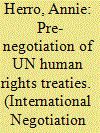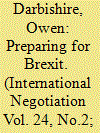| Srl | Item |
| 1 |
ID:
165680


|
|
|
|
|
| Summary/Abstract |
Within the study of mediation, a common argument is that mediators are often successful because they provide credible information to combatants thereby reducing asymmetries of information. Unfortunately, there are a number of reasons to assume that rebel groups are providing misinformation to mediators as well as to the government. Equally, mediators must also deal with an incumbent government that may not be negotiating in good faith. This study suggests that rebel group structure may assist with this problem. Rebel groups that operate parallel political wings often inadvertently signal their reservation points in an effort to mobilize support. Mediators also seek signals that the government is willing to credibly commit to a settlement. Leadership turnover may be one such signal, as new leaders are not beholden to old vested interests. To evaluate these propositions, a statistical test of mediation efforts in civil wars is conducted from 1989 to 2005.
|
|
|
|
|
|
|
|
|
|
|
|
|
|
|
|
| 2 |
ID:
165681


|
|
|
|
|
| Summary/Abstract |
Previous quantitative mediation research has relied on generalized measurements of “mediation success,” such as agreements, ceasefires or peace durability. However, these measurements of success do not take into account what mediators were mandated to achieve. We propose benchmarking outcomes against the explicit mandates of the interventions, a novel way of conceptualizing mediation success. Utilizing data on the agendas of mediated negotiations in intrastate armed conflicts in Africa between 1990 and 2010 as a proxy for mediation mandates, we examine the relative effectiveness of manipulation as a mediation strategy. The study shows, in contrast to previous research, that third party manipulation does not have a significant effect on whether the goal of a given round of negotiations is achieved and, that under some circumstances, may decrease the likelihood of mediation success. We discuss the opportunities as well as limitations of a mandate-based approach to the study of mediation success.
|
|
|
|
|
|
|
|
|
|
|
|
|
|
|
|
| 3 |
ID:
165678


|
|
|
|
|
| Summary/Abstract |
This research examines the effect of mediators’ characteristics on mediation outcomes. In the current study of international mediation, one group of scholars argues that biased mediators with a considerable interest at stake in the dispute are usually effective. Others stress that mediator neutrality is a precondition for mediation to be successful. To test these claims, this study evaluates the Philippines’ qualifications as a mediator for the Borneo confrontation between Indonesia and Malaya in the 1960s. Although the Philippines’ strong ties to both disputants qualified it as an impartial mediator, its ongoing dispute with Malaya over Sabah transformed the Philippines into a biased/interested mediator in the Borneo confrontation. This research illustrates how effective the Philippines was in mediating the Borneo confrontation. It also sheds light on the possible futility of South Korea’s involvement as a third party in the People’s Republic of China-Japan territorial dispute.
|
|
|
|
|
|
|
|
|
|
|
|
|
|
|
|
| 4 |
ID:
165679


|
|
|
|
|
| Summary/Abstract |
Since 1965, nine UN human rights treaties have been adopted. Surprisingly, we know little about the conditions under which states arrived at the negotiation table because there has been no serious attempt to empirically identify the unique attributes of pre-negotiation in this context. This article examines the pre-negotiation of the UN Convention on the Rights of Persons (CRPD), drawing on diverse qualitative data sources such as interviews with state and non-state participants. Informed by a constructivist perspective, this study identifies esteem-seeking behavior as a key motivation for some states to negotiate. The article also shows how a transnational advocacy network influenced the pre-negotiation process by leveraging states’ esteem-seeking ambitions and appealing to their reputation as a way of pushing parties to negotiate. Additional tactics that the transnational advocacy network employ at the international level to expedite negotiations are also identified.
|
|
|
|
|
|
|
|
|
|
|
|
|
|
|
|
| 5 |
ID:
165682


|
|
|
|
|
| Summary/Abstract |
The UK ‘Brexit referendum’ set in motion a unique and highly complex set of negotiations to withdraw from a fundamentally embedded economic and political union. The final referendum was preceded by a nine-month pre-negotiation phase; this article examines the dynamics of that stage. The context of a unilaterally initiated negotiation, together with the economic and political costs associated with it, distinguish it from the existing literature. Three analytical approaches are combined and built upon in this article: the tasks of the pre-negotiation phase, the readiness of the temporal moment, and the demands of multi-level, multi-party negotiations. The concept of psychological readiness has broad theoretical import, though explicit recognition is given that negotiators are not unitary decision makers and that the incorporation of a political analysis is required. The combination of these frameworks provides insight into the dynamics of this phase and the difficulties experienced by both the UK and EU27.
|
|
|
|
|
|
|
|
|
|
|
|
|
|
|
|
| 6 |
ID:
165677


|
|
|
|
|
| Summary/Abstract |
This article examines the forces that encourage targets and challengers involved in claim disputes to offer concessions first. Our framework focuses upon reputation and pressure as key forces that can influence concession-making by claim dispute targets and challengers. We argue that past concession behavior both inside and outside of a claim dyad influences the willingness to make concessions, but does so in distinct ways. We also argue that pressure arising from internal conflict within the disputants and from major power involvement in managing the dispute, also influences the occurrence of concession-making. The results of our hazard analysis show that states involved in claim disputes do consider their opponent’s previous concession-making behavior. Our findings point clearly to the history of concessions within the dyad as a key influence on subsequent concession-making and that major power involvement increases the likelihood of concession-making by both challengers and targets.
|
|
|
|
|
|
|
|
|
|
|
|
|
|
|
|